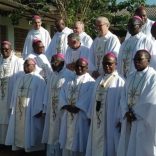Angola/Mozambique: Commit to eliminating cholera by 2030 - African Union
Isabel finds courage to demand an end to violence against women in Mozambique

Photo: Lusa
Isabel Sofia was accused by her family of killing her own daughter in a car crash in October but, despite this stigma, took to the streets on Friday to demonstrate for a “world without violence against women”.
The 42-year-old social activist could not contain herself and burst into tears when asked if she had been the victim of violence – a question which rekindles recent painful episodes.
There is double pain – on the one hand, on the death of her 23-year-old daughter, who was also an activist, and on the other, her trial by the family, which has condemned her.
“They blame me for my daughter’s death,” the social worker and activist at Hi Xikanwe said.
Isabel Sofia’s daughter died in October in a car accident involving her car which she and one other occupant survived. “The question is how I survived. They accuse me of killing her and are turning my own children against me,” the mother of seven alleges.
The scars of the accident are still visible on her body, but they hurt less than the stigma she suffers today. “They wouldn’t let me cry over my daughter’s death,” she complains, claiming that she is suffering as a result of being a woman in a patrilineal country.
“They wouldn’t let me sleep. My husband would wake me up to explain what happened that day,” she said Isabel Sofia. Knowing her rights makes her a wayward and disobedient woman in the eyes of her family, she says.
Though the memories of that painful day remain with her, on Friday she took to the streets along with dozens of other people and marched for an end to violence against girls.
The march began on Avenida Eduardo Mondlane at 3:20 p.m., when dozens of people, mostly women, gathered at the foot of the statue of the Mozambican Liberation Front founder who fought against the colonial regime – the man who is considered the “architect of national unity”.
Wielding placards repudiating violence against women, Isabel Sofia and dozens of others walked nearly two kilometres, singing songs praising Mozambican woman and demanding the implementation of the laws protecting them.
“The laws are good, but the mistake is in the enforcement. We are not saying that the rulers are not doing a good job, but we are saying that violence against women should stop,” another Mozambican activist, Catarina, told Lusa.
While the struggle of Isabel Sofia and so many other Mozambican women finds a voice in the provincial capitals, the figures on domestic violence and premature marriage remain daunting, especially in the countryside.
In 2018, Mozambique recorded about 25,000 cases of domestic violence, of which 12,000 were against women.












Leave a Reply
Be the First to Comment!
You must be logged in to post a comment.
You must be logged in to post a comment.